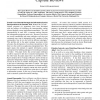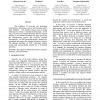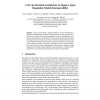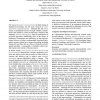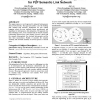112
click to vote
CJ
2006
15 years 2 months ago
2006
s the development of an abstract description of what there is in the world in an application-independent form. This paper argues that attempts to support information systems intero...
126
click to vote
BMCBI
2008
15 years 2 months ago
2008
Background: The explosive growth of biological data provides opportunities for new statistical and comparative analyses of large information sets, such as alignments comprising te...
147
click to vote
CATA
2003
15 years 3 months ago
2003
The problems of accessing and integrating heterogeneous information sources are becoming centerstage problems. One problem arising from accessing heterogeneous sources is semantic...
107
click to vote
WONTO
2008
15 years 3 months ago
2008
Agents are becoming a popular technology for the development of distributed, heterogeneous and always available systems. In those systems, interactions are essential, but semantic ...
121
click to vote
EPIA
2003
Springer
15 years 7 months ago
2003
Springer
Abstract. A theoretical model for agents interaction to study semantic heterogeneity is proposed. The context of this study is informational agents with knowledge bases that are he...
128
click to vote
COSIT
2003
Springer
15 years 7 months ago
2003
Springer
The discovery of services that are appropriate for answering a given question is a crucial task in the open and distributed environment of web services for geographic information. ...
109
click to vote
KCAP
2005
ACM
15 years 7 months ago
2005
ACM
The vision of semantic interoperability, the fluid sharing of digitalized knowledge, has led much research on ontology/schema mapping/aligning. Although this line of research is f...
111
click to vote
SEMWEB
2007
Springer
15 years 8 months ago
2007
Springer
Abstract. As the Semantic Web emerges the problem of semantic heterogeneity is becoming more acute. Ontology matching techniques aim at tackling this problem by establishing corres...
102
click to vote
ESWS
2007
Springer
15 years 8 months ago
2007
Springer
Abstract. Creating a coherent set of ontologies to support a collaborative design process amongst different firms which develop mechatronic products is a challenge due to the seman...
111
click to vote
WWW
2004
ACM
16 years 2 months ago
2004
ACM
This paper proposes a novel approach to integrate heterogeneous data in P2P networks. The approach includes a tool for building P2P semantic link networks, mechanisms for peer sch...
